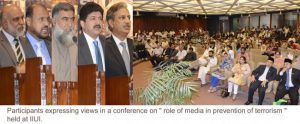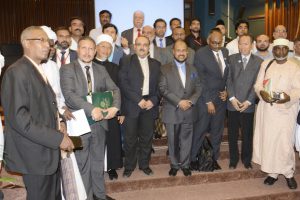The Conference on “Role of Media in the Prevention of Extremism and Terrorism” concluded here at Faisal Masjid campus of the Inte rnational Islamic University, Islamabad (IIUI) on Tuesday with recommendations that Organization of Islamic Conference (OIC) to develop common media strategy in order to counter western main stream print and electronic media Propagandas of Islamophobia and media literacy be promoted among Muslims so that they don’t accept blindly information on social media.
rnational Islamic University, Islamabad (IIUI) on Tuesday with recommendations that Organization of Islamic Conference (OIC) to develop common media strategy in order to counter western main stream print and electronic media Propagandas of Islamophobia and media literacy be promoted among Muslims so that they don’t accept blindly information on social media.
The conference experts and journalists opined that a subject related to the role of media in prevention of extremism and terrorism should be introduced at BS & MS levels in universities of Muslim world.
Participants said that it is responsibility of Muslim scholars and media persons to promote the true teaching of Islam and propagate it through mass media and counter the anti-Islam propaganda. They stressed to establish a special body to analyze extremist ideologies in Islamic countries on social media and the mainstream media.
The conference was organized by department of Media and Communication Studies of IIUI, where experts of media, diplomats, senior journalists, Vice chancellors and representatives hailing from Thailand, Sudan, Uganda, Kingdom of Saudi Arabia, UAE, Jordan, Qatar and Brunei Darussalam expressed views in session through lectures, papers and addresses.
“Race for ratings and sensationalism be discouraged and such attitudes be controlled immediately as both lead to the extremism and terrorism and create intolerance in the society” said, Absar Alam, Chairman Pakistan Electronic Media Regulatory Authority (PEMRA) in his speech in the concluding ceremony of the conference.
He said that media cannot be allowed to disseminate uncertainty among the masses adding that it would result in worst aftermaths in near future. He told that PEMRA was keen to regulate fourth pillar of state to make it a source of positive developments in the country.
Senior Journalist, Hamid Mir said that it was not media which had to deal with the terrorism and extremism but it was the responsibility of the state to ensure it. He added that no country can get rid of terrorism unless it does not provide freedom to media and judiciary. Hamid Mair furthered that media was mirror of the society and getting rid of extremism was only possible with the collective efforts as media in solitary role was not responsible for this.
IIUI Rector, Dr. Masoom Yasinzai said that freedom of speech was fundamental prerogative of an individual and universities were the places to promote this salient feature of an ideal and progressed society. He called for freedom with a sense of responsibility and added that teachers should come forward to aware youths about the future narrative and road map to deal with constraints raised by negative elements working against Muslim societies.
Dr. Al-Draiweesh, IIUI President emphasized to analyze the situation across the Muslim world and develop a counter narrative to disseminate Islam’s true message of peace and tolerance.
 He called to nullify the lethal plans of negative elements and urged the Muslim societies to forge unity among their ranks. Dr. Ahmed Yousif Al-Draiweesh said that media was the most vital tool in prevailing circumstances to deal with the menace of terrorism.
He called to nullify the lethal plans of negative elements and urged the Muslim societies to forge unity among their ranks. Dr. Ahmed Yousif Al-Draiweesh said that media was the most vital tool in prevailing circumstances to deal with the menace of terrorism.
He stressed that dissemination of Islam’s true message of peace and discouragement of the violence and extremism through media was a pre-requisite. He also called for a linkage between the Muslim scholars and media and added that both, together, can help in establishing a road map to counter the issue of terrorism.
IIUI President presented five points for dealing with the problem of terrorism which included content to aware the youths regarding negative impacts of terrorism, dealing with wrong interpretations of Islam disseminated by negative elements. In third point, he emphasized upon Muslim intellectuals to play role in building narrative against intolerance and violence. In fourth point, IIUI President suggested that such conferences be arranged with more frequency and he concluded while saying that appropriate and accurate knowledge of Holy Quran and Sunnah among youths was necessary.
On the occasion, Dr. Zafar Iqbal, Chairman Department of Media and Communication Studies thanked the participants and foreigner guests and presented recommendations of the conference.

